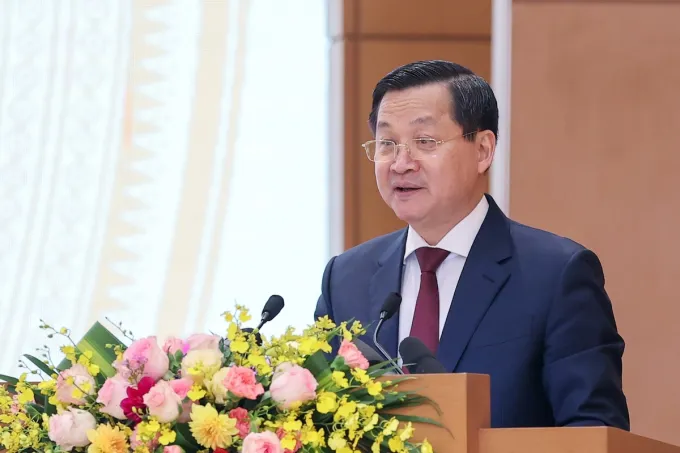Vietnamese Gov’t to prioritize capital market development in 2023
This is part of an overall plan for Vietnam to stabilize economic fundamentals, contain inflation, and boost growth.
In 2023, the Vietnamese Government would prioritize the safe and healthy development of bond, securities, and real estate markets while ensuring the lawful rights of businesses and people.
| Deputy Prime Minister Le Minh Khai. Source: VGP |
Deputy Prime Minister Le Minh Khai revealed the priority included in the Government’s draft resolution on socio-economic development in 2023 at the national conference between the Government and provinces and cities on January 3.
According to Khai, the draft resolution identifies 11 solutions for Vietnam to achieve sustainable development in 2023, focusing on stabilizing economic fundamentals, containing inflation, and boosting growth.
“Monetary policy should be consistent with expansionary fiscal policy and other management tools,” Khai said.
In addition to plans to deal with weak banks, Khai expects the government to continue its efforts to promote the healthy and sustainable development of the capital market, including the money, credit, corporate bond, securities, and real estate markets.
Last year, the government clamped down to restore order in the market, resulting in the detection of irregularities in the corporate bond and stock markets committed by Tan Hoang Minh or FLC.
“The ongoing restructuring process is aimed at preventing the risk of market manipulation and ensuring lawful rights and interests of businesses, investors, and people,” he added.
A report from the Ministry of Planning and Investment revealed as of December 30, the total volume of corporate bonds issued via private placement was estimated at VND333.4 trillion (US$14.17 billion), but the figures had been on the decline every quarter.
On the stock market, the Vn-Index benchmarked 1,007.09 on the year’s final session, down 4% against the previous month and 33% from late 2021.
The combined market capitalization stood at VND5,200 trillion ($221 billion), equivalent to 55% of the country’s GDP in 2022, while the average liquidity per session stood at VND20.2 trillion ($858.4 million), down 24% compared to last year.
The draft resolution also stressed the government's need to tighten the management of commodities regulated by the state administration, especially electricity and petroleum products.
In addition, the Government would promote efficiency in the economic restructuring associated with the revision of the growth model.
“The objective is to enhance labor productivity and economic quality along with its competitiveness, independence, and resilience against external shocks,” he said.
Among the main goals, Khai expected the Government to accelerate the disbursement of public funds and the restructuring of state-owned enterprises during the 2021-2025 period.
“It is essential for the Government to effectively utilize state resources for economic development,” he asserted.
The draft resolution mapped out the objective to promote innovative production and service sectors with increased application of science and technology, with a share of the digital economy in total GDP of 15%.
In the infrastructure development effort, the Government would speed up the execution of key transport projects that would help boost inter-provincial linkage and socio-economic development in major urban cities.
The resolution added the authorities are set to finalize the legal framework on e-commerce infrastructure and the management of crypto assets and digital currencies.
“Another priority includes the development of the human resource, especially high-quality workforce along with a focus on R&D, application of science and technology, to enhance productivity and economic competitiveness,” he added.
Hanoi targets GRDP growth of 7% in 2023
Following a record-high economic growth of 8.89% year on year in 2022, the city has set the GRDP growth target of 7% for this year.
In this regard, Hanoi’s authorities expected to continue creating policies to support economic activities while closely monitoring the global and domestic situation to ensure the job security of the local population, especially in rural areas and industrial parks.
In addition, Hanoi would promote craft village development and expand the investment in craft village industrial clusters, move production activities out of residential areas, and create a favorable legal environment to attract capital into industrial parks.
Other priority for Hanoi includes the development of transport infrastructure, especially highways to boost inter-provincial connections and ring roads to create new growth spaces, along with economic production facilities of industrial parks, shopping malls, hotels, and financial service centers.
The rapid and sustainable development of the city in this context must be based on high technologies, innovation, and digitalization, towards the formation of three pillars: digital government, digital society, and digital economy.












